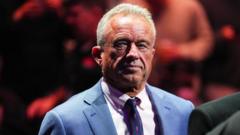In a bold move to reform America's food system, Robert F. Kennedy Jr., newly appointed by President-elect Trump to lead the Department of Health and Human Services (DHHS), is taking aim at ultra-processed foods, artificial additives, and harmful food production practices. A self-proclaimed advocate for better nutrition, Kennedy’s vision includes a complete overhaul of food safety regulations and FDA operations. He emphasizes the detrimental effects of processed foods on children's health, calling it a "toxic soup," and plans to eliminate harmful food dyes while promoting healthier school lunches. However, experts raise concerns about Kennedy’s controversial history and the feasibility of his ambitious reforms, noting the complex regulatory landscape and potential pushback from the influential food industry.
**Can RFK Jr. Revolutionize America's Food System?**

**Can RFK Jr. Revolutionize America's Food System?**
Aiming for a healthier nation, RFK Jr. targets ultra-processed foods while facing industry opposition.
Kennedy has been a vocal critic of the food industry's impact on public health, arguing that ultra-processed foods contribute significantly to chronic diseases such as diabetes and cardiovascular issues. In rallying for his campaign slogan, "Make America Healthy Again," he fosters bipartisan support among some lawmakers and health experts who agree on the need for reform. His nomination has provoked discussions about the FDA's role in ensuring food safety, while nutrition experts applaud initiatives aimed at minimizing harmful additives.
However, Kennedy's history of inflammatory health claims complicates his credibility. Critics express skepticism about the practicality of his proposals, noting that changes to food regulation would require significant political and bureaucratic challenges. Furthermore, the backlash from food industry stakeholders can pose hurdles to achieving the sweeping reforms he envisions.
Despite these challenges, public health advocates see an opportunity for Kennedy to reshape dietary guidelines and make meaningful improvements to the food system. As discussions surrounding nutrition and public health intensify, many are paying close attention to whether Kennedy can navigate the intricate balancing act between health advocacy and industry interests, and deliver on promises to improve America's dietary landscape.
However, Kennedy's history of inflammatory health claims complicates his credibility. Critics express skepticism about the practicality of his proposals, noting that changes to food regulation would require significant political and bureaucratic challenges. Furthermore, the backlash from food industry stakeholders can pose hurdles to achieving the sweeping reforms he envisions.
Despite these challenges, public health advocates see an opportunity for Kennedy to reshape dietary guidelines and make meaningful improvements to the food system. As discussions surrounding nutrition and public health intensify, many are paying close attention to whether Kennedy can navigate the intricate balancing act between health advocacy and industry interests, and deliver on promises to improve America's dietary landscape.






















